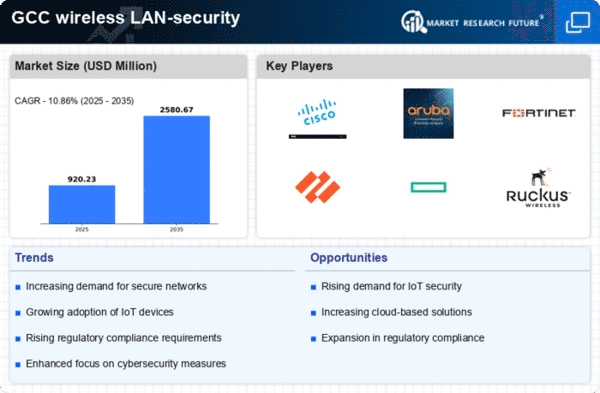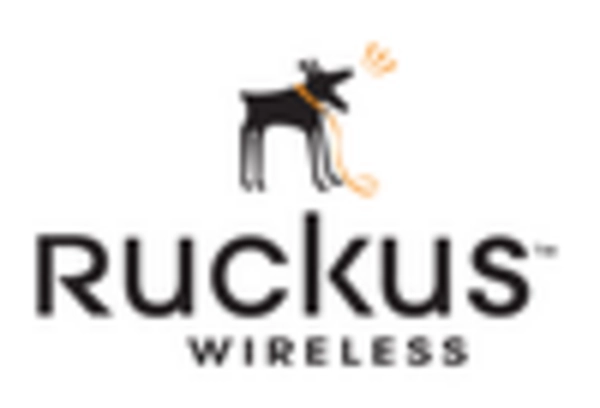Rising Cyber Threats
The wireless LAN-security market is experiencing heightened demand. This demand is due to the increasing frequency and sophistication of cyber threats. Organizations in the GCC are recognizing the necessity of robust security measures to protect sensitive data and maintain operational integrity. Reports indicate that cybercrime costs could reach $10.5 trillion annually by 2025, underscoring the urgency for enhanced security solutions. As businesses transition to remote work and cloud services, vulnerabilities in wireless networks become more pronounced. Consequently, investments in advanced security protocols and technologies are essential to mitigate risks. This trend is likely to drive growth in the wireless lan-security market, as companies seek to safeguard their digital assets against evolving threats.
Growing Mobile Workforce
The wireless lan-security market is significantly influenced by the expansion of the mobile workforce in the GCC. As organizations adopt flexible work arrangements, employees increasingly rely on wireless networks to access corporate resources remotely. This shift necessitates the implementation of stringent security measures to protect sensitive information from unauthorized access. According to recent studies, approximately 70% of employees in the region work remotely at least part of the time, highlighting the need for secure wireless connections. Companies are investing in solutions that ensure secure access to networks, thereby driving demand in the wireless lan-security market. The focus on securing mobile devices and remote access points is expected to shape the future landscape of wireless security.
Technological Advancements
The wireless lan-security market is poised for growth due to rapid technological advancements in security solutions. Innovations such as next-generation firewalls, intrusion detection systems, and advanced encryption methods are becoming increasingly prevalent. These technologies enhance the ability to detect and respond to threats in real-time, thereby improving overall network security. The GCC region is witnessing a surge in the adoption of these advanced solutions, with market analysts projecting a compound annual growth rate (CAGR) of 15% for the wireless lan-security market over the next five years. As organizations seek to stay ahead of cyber threats, the integration of cutting-edge technologies will likely drive further investments in wireless security.
Rising Awareness of Data Privacy
The wireless LAN-security market is benefiting from a growing awareness of data privacy. This awareness is present among consumers and businesses alike. As data breaches become more prevalent, stakeholders are increasingly concerned about the protection of personal and sensitive information. This heightened awareness is prompting organizations in the GCC to prioritize investments in wireless security solutions that ensure data integrity and confidentiality. Surveys indicate that over 60% of consumers are willing to switch brands if their data is compromised, emphasizing the importance of robust security measures. Consequently, businesses are compelled to enhance their wireless security protocols, driving demand in the wireless lan-security market as they seek to build trust and safeguard their reputations.
Increased Regulatory Requirements
The wireless LAN-security market is being shaped by the introduction of stringent regulatory requirements. These requirements span various sectors in the GCC. Governments are implementing regulations that mandate organizations to adopt comprehensive security measures to protect sensitive data. Compliance with these regulations is not only essential for legal adherence but also for maintaining customer trust. For instance, the introduction of data protection laws has compelled businesses to invest in robust wireless security solutions. As a result, the demand for compliance-driven security measures is expected to propel growth in the wireless lan-security market. Organizations are increasingly prioritizing investments in security frameworks that align with regulatory standards.
















